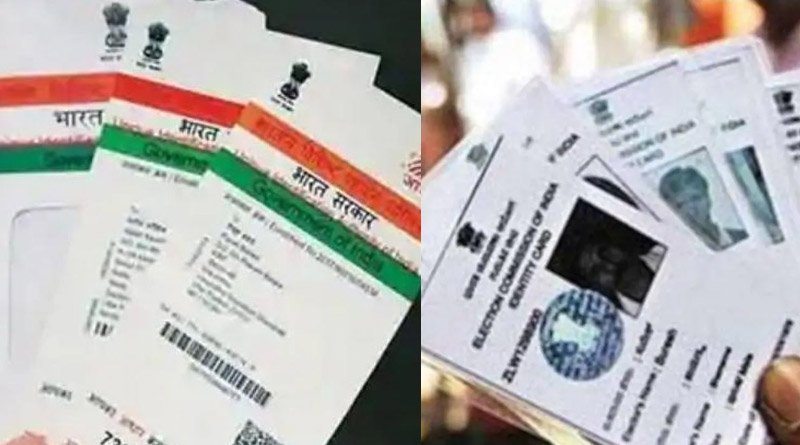
A controversial attempt is underway to link Aadhaar to Voter IDs. This is being pitched as a part of wider electoral reforms that have all but been greenlighted. A draft bill to this effect has already been approved by a Cabinet committee.
In November, Standing Committee on Personnel, Public Grievances, Law and Justice, headed by Rajya Sabha member Sushil Kumar Modi, had met to discuss a variety of electoral reforms, such as:
Remote voting
Linking Aadhaar to Voter ID
Common electoral roll
Action against elected representative who file false affidavits
On Wednesday, a Cabinet committee approved the linkage of Aadhaar with Voter IDs along with a few others electoral reforms. These include:
Allowing first time voter four opportunities in a year to enroll their name in the Voters’ list, instead of the previous provision that only allowed this if one had turned 18 before January 1 of that year.
Making electoral law gender neutral for service voters, thereby permitting husbands of female service persons to be enrolled as service voters, along with the previous provision of just allowing wives of servicemen to be enrolled.
The electoral reforms bill is likely to be introduced in the ongoing Winter Session of the Parliament. This could enable for the bill to be passed in time for the upcoming state assembly elections in Uttar Pradesh, Manipur, Goa and Punjab.
Purpose of linkage, and concerns about misuse
The linking is ostensibly to enable weeding out of fake voters or duplications from electoral rolls. The bill narrowly avoids violating a Supreme Court judgment by making the linking “voluntary” and says that the Aadhaar information will only be used “for authentication purposes.”
It is noteworthy that the Supreme Court had, in its judgment, allowed use of Aadhaar only for availing government schemes, shooting down the requirement to provide Aadhaar data to private players such as banks, telephone companies etc. Thus, the provision in the proposed bill for linking Aadhaar to Voter ID voluntarily and only for authentication, allows for a bit of a gray area, given how this could be argued by some to provide a smoother experience for the voter hoping to get enrolled or update their information, and thus exercise their Right to Vote.
But it is at this point, one must remember the words of Justice DY Chandrachud, the sole judge on the Supreme Court Bench, to write a dissenting judgment. He had expressed his apprehensions about the misuse of data for profiling saying, “Biometrically enhanced identity information, combined with demographic data such as address, age and gender, among other data, when used in increasingly large, automated systems creates profound changes in societies, particularly in regard to data protection, privacy, and security. Biometrics are at the very heart of identification systems. There are numerous instances in history where the persecution of groups of civilians on the basis of race, ethnicity and religion was facilitated through the use of identification systems. There is hence an alarming need to ensure that the on-going development of identification systems be carefully monitored, while taking into account lessons learnt from history.”
It is this part that sends a shiver down the spine, given how Aadhaar data can possibly be used for voter profiling, targeting and even subsequent gerrymandering if Aadhaar is linked with Voter ID.
Renewed concerns about linking Aadhaar and Voter ID
SabrangIndia had reported previously on how over 500 entities such as civil rights groups including Association for Democratic Reforms (ADR), Peoples’ Union of Civil Liberties (PUCL), Adivasi Women’s Network, Chetna Andolan, etc.; as well as groups working to defend digital freedoms and rights, such as Rethink Aadhaar, Article 21 Trust, the Internet Freedom Foundation (IFF), and the Free Software Movement of India, as well as activists, journalist and educators including CJP secretary Teesta Setalvad signed a statement calling the move to link Aadhaar with Voter ID “ill-thought, ill logical and unnecessary”.
The statement says that the signatories “are deeply concerned that this will almost certainly lead to mass disenfranchisement, could increase voter fraud, given the mass discrepancies in the Aadhaar database, and could violate people’s right to privacy by enabling voter profiling through the linkage of data sets.” It further elaborates, “India currently has no data protection law, and the current personal data protection bill has wide exceptions for the government. Any attempts to link Aadhaar to the voter IDs, would lead to demographic information which has been linked to Aadhaar, being linked to the voter database. This creates the possibilities for disenfranchisement based on identity, of increased surveillance, and targeted advertisements and commercial exploitation of private sensitive data.”
A key reason cited is the violation of privacy and secrecy of vote. If the revelations of the Cambridge Analytica scandal where Facebook data of millions of users was used to allegedly rig the US elections in favour of Donald Trump by micro-targeting voters with false news is anything to go by, imagine the ramifications if it was demographic data of millions of Indians sourced from the Aadhaar database…
Response to Cabinet decision
Ever since the story broke, responses have started trickling in. Different rights groups and civil society members have reiterated their apprehensions. The Free Software Movement of India released a statement saying, “The use of Aadhaar for voting process is not a proportionate exercise and has (sis) the potential threat to the entire idea of secret ballot.”
FSMI statement on Council of Cabinet Ministers proposal to link Aadhaar with VoterID.#FSMI #Aadhaar @ECISVEEP pic.twitter.com/Hf8p1KUIee
— Free Software Movement of India (@fsmi_in) December 16, 2021
Related:
Aadhaar linking to Voter ID: Empowering voters or enabling surveillance?
SC upholds Aadhaar’s Constitutional Validity, but partially addresses Privacy Concerns